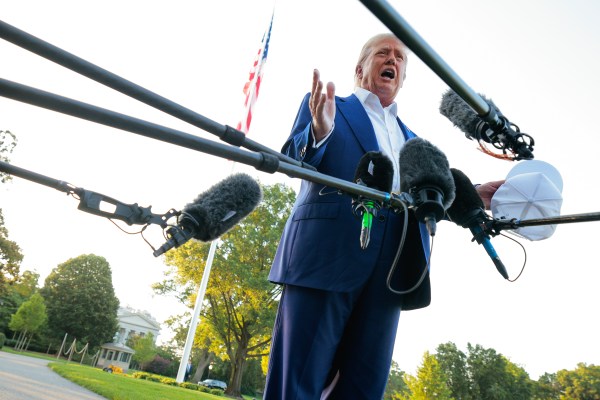In general, one supposes that it is a good thing that most folks living in liberal democracies are not prone to think the most terrible things about other human beings. If trust is the lubricant that makes our laws and everyday activities run smoothly, then, that prejudice is an understandable one. But, of course, the downside is that it leaves those same liberal democracies at times blind to the worst behavior or, if not totally blind, often slow to wrap our heads around it.
One doesn’t need to go deep into history to prove this: The famine in Ukraine and the Holocaust are events that readily come to mind. In our own day, think how long it took for the West to understand that China had created a vast gulag designed to extinguish as much as possible Uighur identity in Xinjiang. Arguably, we still haven’t fully wrapped our heads around its scale and brutality. And over the past few months, we’ve been slow to see just how determined Beijing and Communist Party General Secretary Xi Jinping have been to eliminate whatever semblance of autonomy Hong Kong has had, despite the fact that it had signed a formal agreement with London that supposedly guaranteed that self-rule.
Even when Xi made clear that, in the absence of Hong Kong’s ability to pass a law greatly expanding China’s reach into the territory’s affairs, he would just punt on the jurisdictional formalities and have his rubber-stamp National People’s Congress dictate the new law over Hong Kong, there were plenty of officials, businessmen, and pundits who couldn’t believe that Beijing actually intended to use the law in any serious fashion. It was a deterrent aimed at the pro-democracy protests and meant to stabilize the situation in Hong Kong—or so folks argued, and hoped.
But, Monday, those hopes crashed when Hong Kong police arrested Jimmy Lai, the publisher of Apple Daily, the popular pro-democracy newspaper, along with other staff and Mr. Lai’s two sons for allegedly violating the new national security law. This was not an event intended to be seen as low-key or done in the dark of night; about 200 police were used to raid the newspaper’s offices and ransack its files; they appeared not to mind having the whole thing livestreamed. And the arrest comes on the heels of the city’s (Beijing appointed) chief executive postponing the city’s September elections—elections that could well have resulted in a large increase of pro-democracy candidates in the city’s assembly. And Lai’s arrest comes only a day after the U.S., Australia, the U.K., Canada, and New Zealand—the “Five Eyes” intelligence-sharing alliance—put out a statement strongly objecting to the cancellation. If the arrest of Lai was not specifically intended to challenge the United States and its security partners, it certainly has had that effect.
It’s also significant that the first high-profile arrest under the new law is Jimmy Lai. If there was ever an example of success gained by living in liberty, it is Jimmy Lai. Born in China, Lai moved to Hong Kong as a teenager, learned the garment business, created his own chain of Gap-like stores in China and Hong Kong, and was forced to sell them after criticizing the Chinese leadership for its authoritarian ways. Lai then went into the publishing business, creating a wildly popular Chinese-language newspaper and magazine in Hong Kong before expanding his publishing efforts by doing the same in Taiwan. Well before Beijing began to squeeze his papers and Hong Kong’s civic freedoms, Lai understood that Taiwan’s democracy, imperfect as it was in his mind, especially its economic policies, offered new opportunities for him. That said, Lai never abandoned Hong Kong, believing support for democracy there was his duty given how the territory’s freedoms had provided the space for his own success.
The fact that Lai was also well known in the halls of Congress, had met with presidents and senior U.S. officials, was certainly something that Beijing understood as well. The evidence is pretty stark that Xi is not, nor has been, inclined to take American and allied concerns into consideration. His goal of completing a unified China, under party control, is no secret. For those in the world’s capitals who seemingly dismiss Chinese ambitions toward Taiwan as more rhetorical than not, it would be good to call to mind how surprised we have been about the scale of China’s war on the Uighurs and how quickly Xi has been able to take control of Hong Kong. When it comes to Secretary Xi, the West would do well—and certainly would have done better—if, instead of immediately defaulting to the relative benign view that he is someone we can deal with, we tried at least initially imagining a leader capable of authorizing the worst.
Photograph by Vernon Yuen/AFP/Getty Images.






Please note that we at The Dispatch hold ourselves, our work, and our commenters to a higher standard than other places on the internet. We welcome comments that foster genuine debate or discussion—including comments critical of us or our work—but responses that include ad hominem attacks on fellow Dispatch members or are intended to stoke fear and anger may be moderated.
With your membership, you only have the ability to comment on The Morning Dispatch articles. Consider upgrading to join the conversation everywhere.